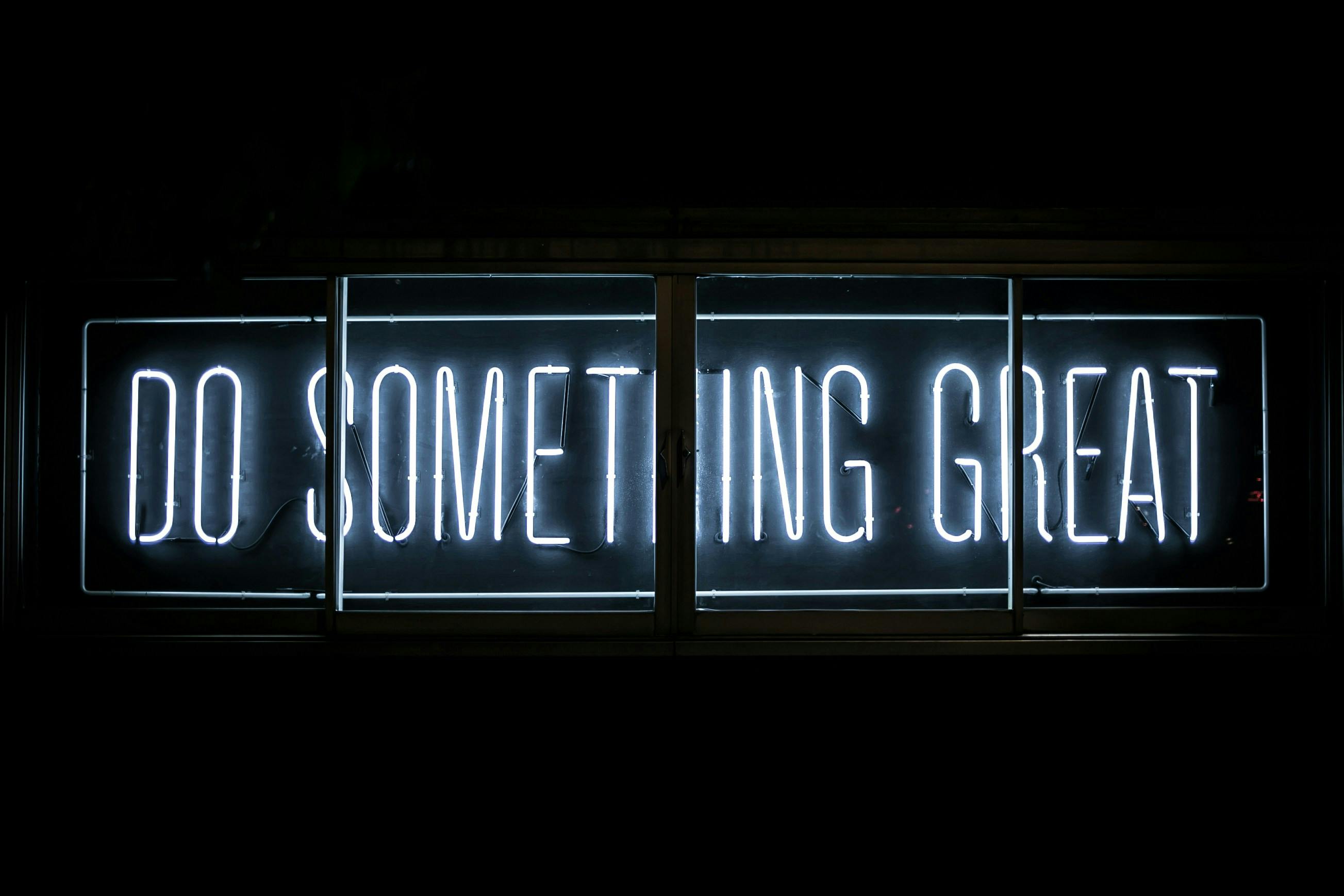Network's Spotlights
Welcome to the Minnesota Health Equity Connections Blog. This space is a tool to celebrate and share our work in health equity.
Welcome to the Minnesota Health Equity Connections Blog. This space is a tool to celebrate and share our work in health equity.
Health Equity Network Spotlight
Check in here to see the spotlights of your networks!
-
Share Spotlight on: Le Sueur and Waseca Counties on Facebook Share Spotlight on: Le Sueur and Waseca Counties on Twitter Share Spotlight on: Le Sueur and Waseca Counties on Linkedin Email Spotlight on: Le Sueur and Waseca Counties link
Spotlight on: Le Sueur and Waseca Counties
12 months ago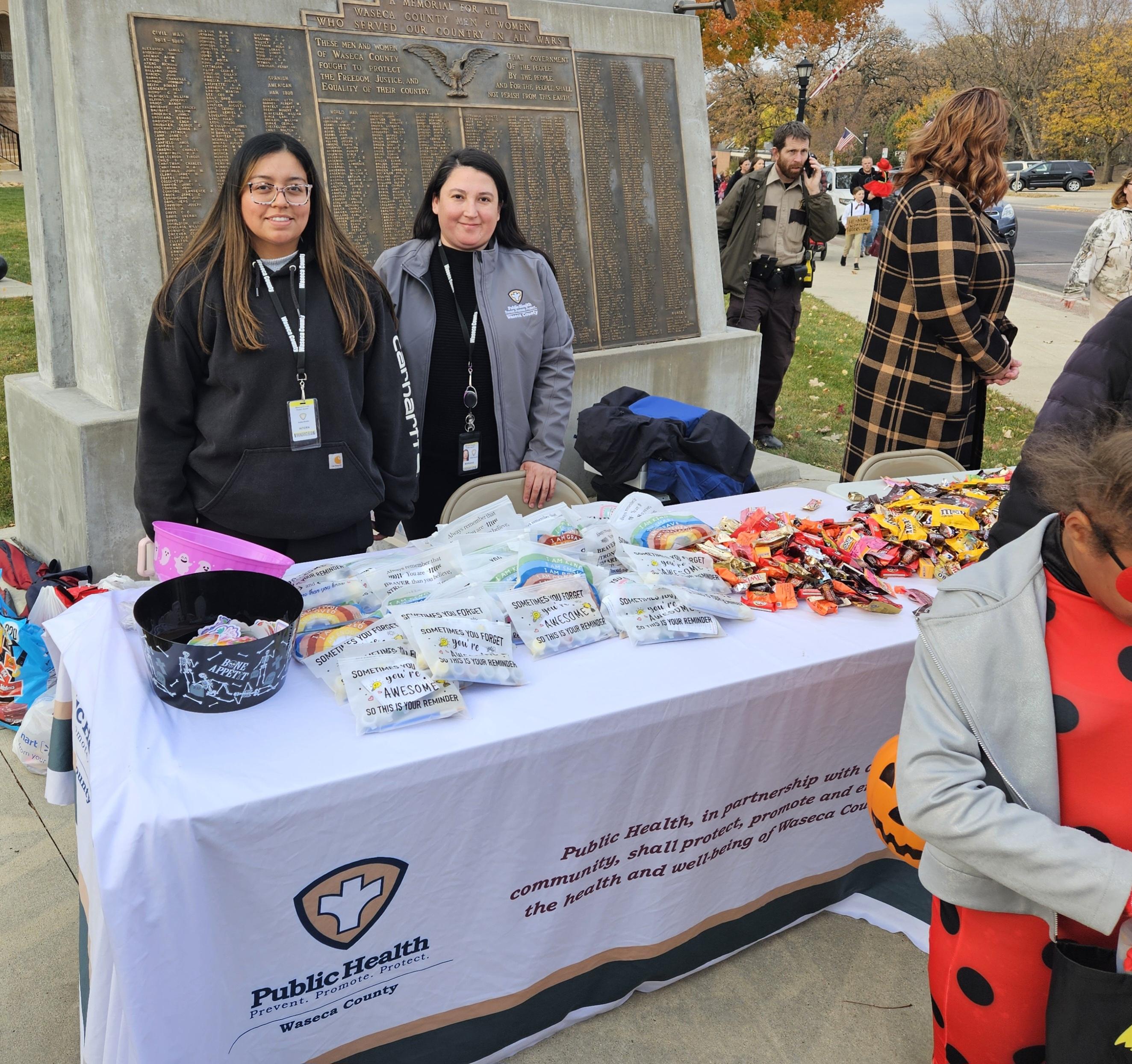
In Le Sueur and Waseca Counties, a dedicated team of public health professionals serves their communities with equity at the forefront while leveraging data to meet future goals. Above all, their own lived experiences, as well as those of their family members, give them insights into community concerns and help to establish meaningful relationships and connections.
Colin Ayers is the community health educator and planner for Le Sueur and Waseca Counties. When he started the position three years ago, he focused on data collection and analysis. Now, he’s also the project lead in areas like mental health, cannabis, opioids, and... Continue reading
-
Share Spotlight on: Dancing Sky Area Agency on Aging on Facebook Share Spotlight on: Dancing Sky Area Agency on Aging on Twitter Share Spotlight on: Dancing Sky Area Agency on Aging on Linkedin Email Spotlight on: Dancing Sky Area Agency on Aging link
Spotlight on: Dancing Sky Area Agency on Aging
12 months agoSpotlight on: Dancing Sky Area Agency on Aging
Named for Minnesota's northernmost scenic drive, which travels along the Rainy River from Voyageurs National Park near the Canadian border west to North Dakota, the Dancing Sky Area Agency on Aging supports a 21-county area. Like the scenic drive it’s named for, Dancing Sky covers a vast area of mostly rural communities. Because of this, it encounters both challenges and opportunities.
Dancing Sky is a program of the Northwest Regional Development Commission and collaborates with many partners and providers. They coordinate the pass-through funding intended to enrich the lives of older adults... Continue reading
-
Share Unjudge someone: Human libraries on Facebook Share Unjudge someone: Human libraries on Twitter Share Unjudge someone: Human libraries on Linkedin Email Unjudge someone: Human libraries link
Unjudge someone: Human libraries
about 1 year agoSpotlight on: Human Libraries, Bemidji State University Social Work Department’s Immersive Learning Experience
The Human Library at the Bemidji State University (BSU) Social Work Department gives a whole new meaning to the phrase "I'm an open book." After Assistant Professor Emily Paine learned about the Human Library Experience, she introduced this innovative concept to the department in 2022. Since then, it has been an integral part of the curriculum in two courses. Assistant Professor Ashley Charwood describes the Human Library as a "microcosm" of the real-world experiences students will encounter in their social work practice.
"Instead of checking out a... Continue reading
-
Share Spotlight on: Faribault and Martin County Health and Human Services on Facebook Share Spotlight on: Faribault and Martin County Health and Human Services on Twitter Share Spotlight on: Faribault and Martin County Health and Human Services on Linkedin Email Spotlight on: Faribault and Martin County Health and Human Services link
Spotlight on: Faribault and Martin County Health and Human Services
about 1 year ago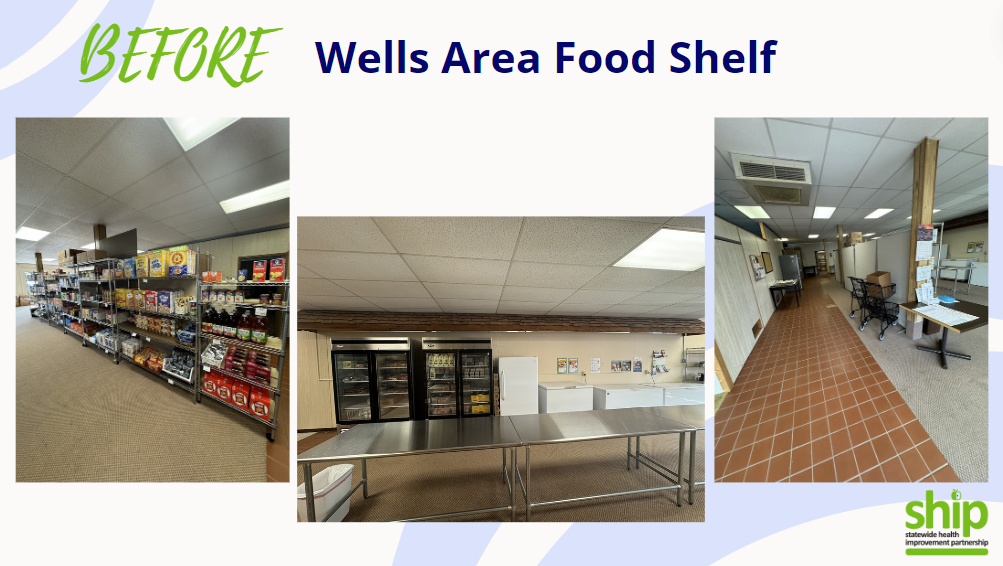
The team working at Faribault and Martin County Health and Human Services is distinctive for many reasons, including the fact that two staff members have the same first name: Kaylee Diefenderfer is the Health Communications Planner, and Kaley Hernandez is the Public Health Planner and Statewide Health Improvement Partnership (SHIP) Coordinator.
Diefenderfer and Hernandez share more than their names. They also share a passion for their work, particularly the Bridges out of Poverty training their agency provides. Funded partly by a Minnesota Health Equity Networks grant, Bridges Out of Poverty is designed to give participants a deeper understanding of poverty... Continue reading
-
Share "No one knows everything, but together we know a lot." on Facebook Share "No one knows everything, but together we know a lot." on Twitter Share "No one knows everything, but together we know a lot." on Linkedin Email "No one knows everything, but together we know a lot." link
"No one knows everything, but together we know a lot."
over 1 year ago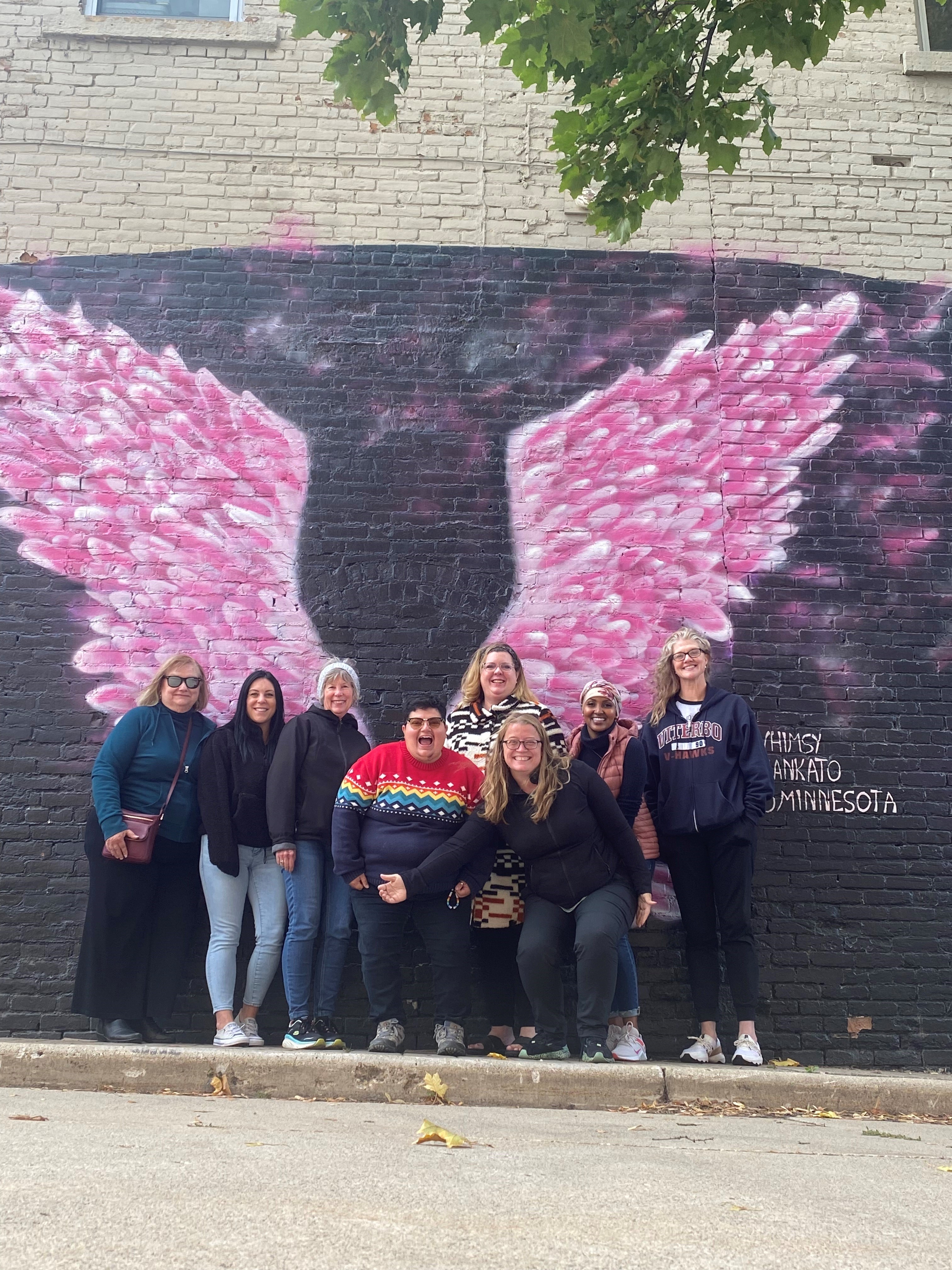
Spotlight on: Minnesota Health Equity Networks
In this month's newsletter, the Networks would like to spotlight its own efforts as they welcome new partners and celebrates two years of health equity work in Minnesota.
The Minnesota Health Equity Networks team photos reveal a lot about their approach to advancing health equity across Minnesota. Gathered in front of meaningful locations, such as in front of a mural in Mankato or by a wall sign that reads "Do the Most Good" at a community gathering space in Minneapolis, these images capture a vibrant, diverse, and united team of collaborators dedicated to their... Continue reading
-
Share Building upon strength and culture on Facebook Share Building upon strength and culture on Twitter Share Building upon strength and culture on Linkedin Email Building upon strength and culture link
Building upon strength and culture
over 1 year ago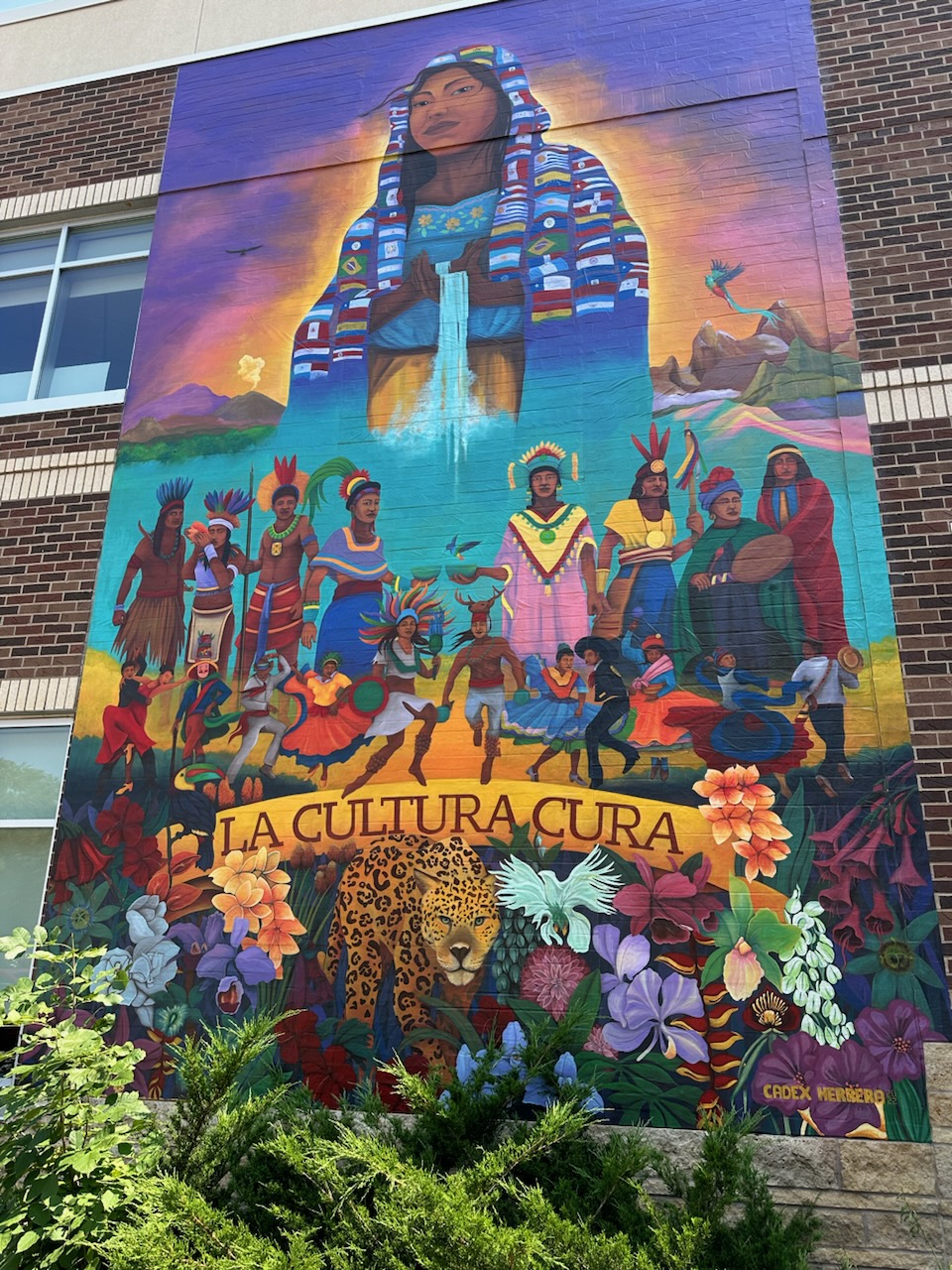
Spotlight on: Comunidades Latinas Unidas en Servicio (CLUES)
Vibrant colors and beautiful images greet visitors even before they enter the Comunidades Latinas Unidas en Servicio (CLUES) offices in St. Paul. Outside the light-filled lobby, a mural features a young girl draped in a shawl decorated with flags of numerous Latin American nations that the people of CLUES represent. Embedded within the symbolic design, a banner holds the text, “La Cultura Cura,” or “Culture Heals,” in English.
The CLUES building in St. Paul houses the Mexican Consulate, offices for the Abriendo Caminos Behavioral Health Department, space for cultural art exhibits, and... Continue reading
-
Share Being a place for compassionate and inclusive sexual healthcare and education on Facebook Share Being a place for compassionate and inclusive sexual healthcare and education on Twitter Share Being a place for compassionate and inclusive sexual healthcare and education on Linkedin Email Being a place for compassionate and inclusive sexual healthcare and education link
Being a place for compassionate and inclusive sexual healthcare and education
over 1 year ago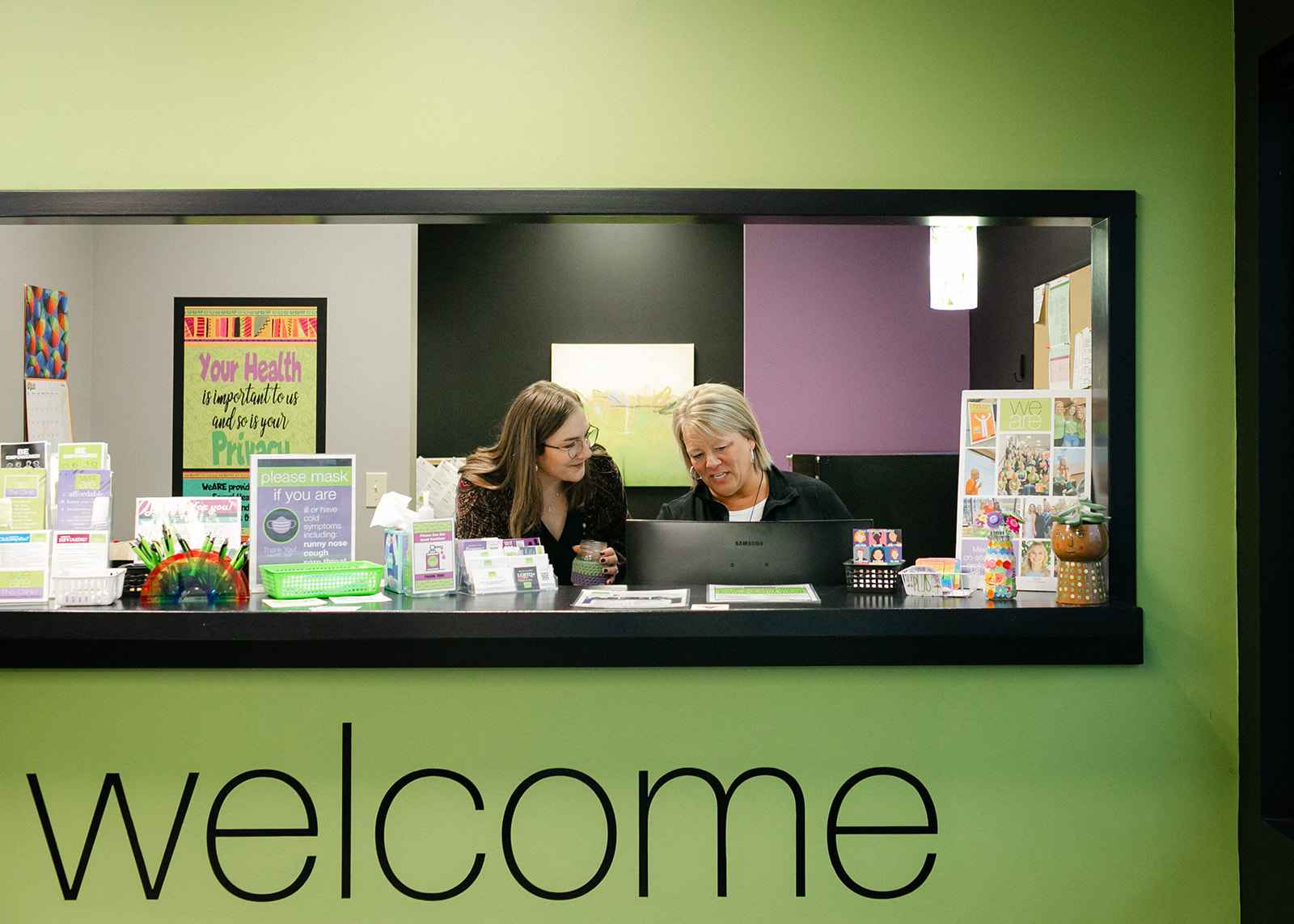
Being a place for compassionate and inclusive sexual healthcare and education
Network member spotlight: WeARE - The Clinic (Brainerd, MN)
View the full July newsletter: Minnesota Health Equity Networks July Newsletter
Tucked in the middle of a strip mall on Oak Street near downtown Brainerd, WeARE – The Clinic boasts cheery bright green and purple signage. It's across the street from the Brainerd Family YMCA and about a block from the local high school. Welcoming and approachable, WeARE is the go-to resource for compassionate and inclusive sexual healthcare, transformational health education programming, and collaborations that serve reproductive justice in the... Continue reading
-
Share Listening to what youth and community want and need on Facebook Share Listening to what youth and community want and need on Twitter Share Listening to what youth and community want and need on Linkedin Email Listening to what youth and community want and need link
Listening to what youth and community want and need
over 1 year ago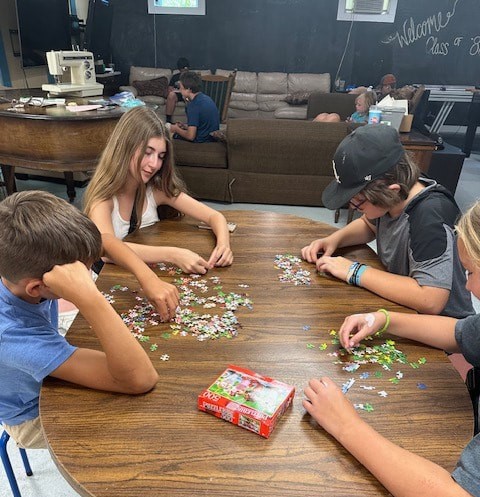
The lower level of the CornerStone Community and Youth Center in Frazee, MN, is a hive of activity. A 40-foot chalk wall, a pool table, ping pong, foosball, TV, and gaming offer artistic creativity and fun. In the Maker’s Space, youth can cook and eat in a full kitchen, with a pantry and cupboards full of ingredients for budding young chefs and cooks. They can learn to make t-shirts, woodworking, painting, sketching, and pottery. Youth can operate equipment like 3-D printers, laser engravers, Cricut Maker 3, and screen printers. Offered to youth from 4th to 12th grade as a free... Continue reading
-
Share Making human to human connections on Facebook Share Making human to human connections on Twitter Share Making human to human connections on Linkedin Email Making human to human connections link
Making human to human connections
over 1 year ago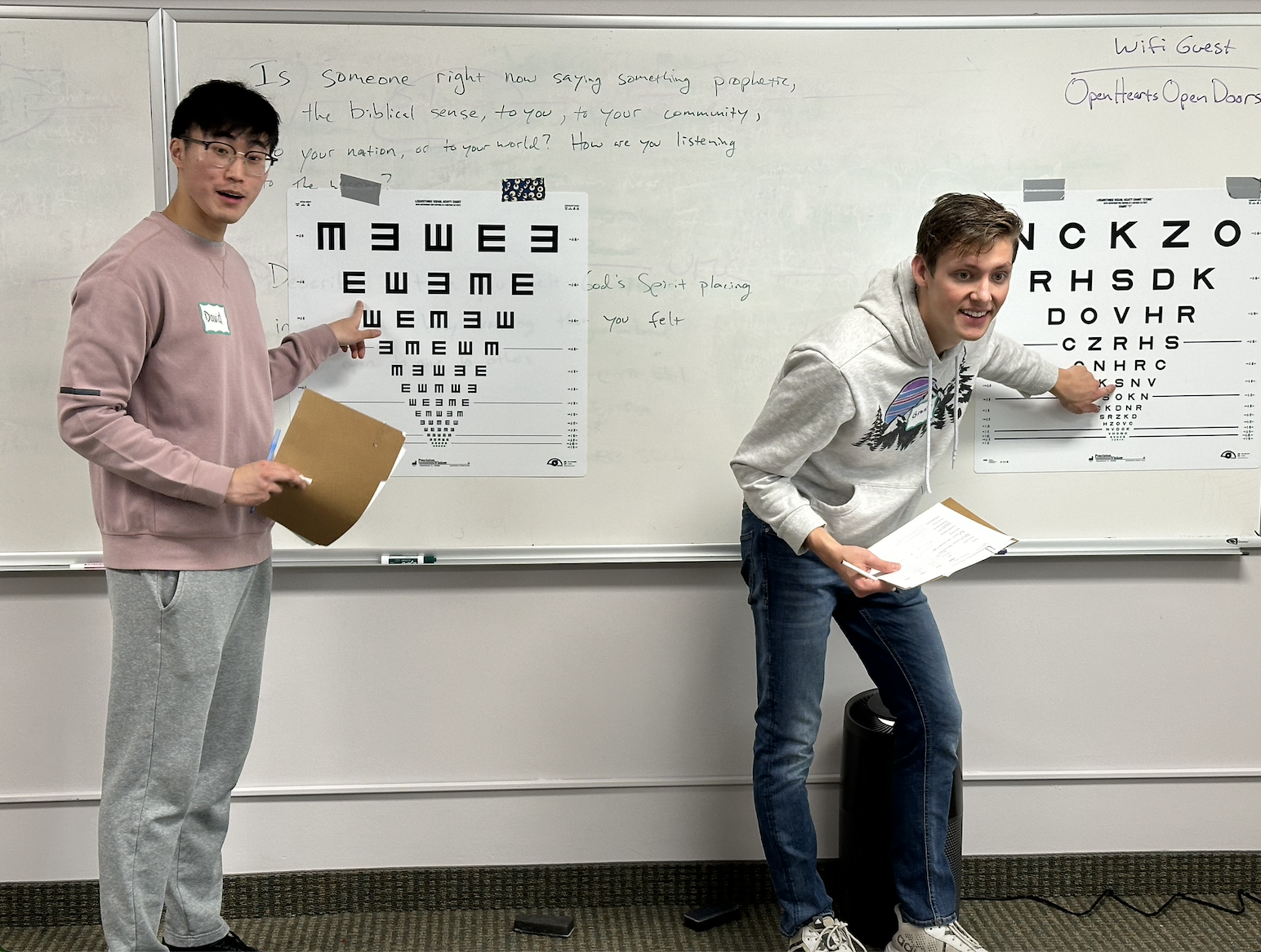
Making human-to-human connections
Network member spotlight: Zumbro Valley Medical Society Foundation Street Medicine Program
View the full May newsletter: Minnesota Health Equity Networks May Newsletter
Three years ago, Zumbro Valley Medical Society (ZVMS) started a Street Medicine program. This program brings together physicians, medical students, community partners, and individuals with lived experience to identify and create effective ways to improve health care for people experiencing homelessness in Olmsted County.
We need to adapt to people and their circumstances rather than expect people to adapt to us.” – Beth Kangas, Executive Director, ZVMS
During “street rounds,” a physician and medical student... Continue reading
-
Share Meeker-McLeod-Sibley Community Health Services on Facebook Share Meeker-McLeod-Sibley Community Health Services on Twitter Share Meeker-McLeod-Sibley Community Health Services on Linkedin Email Meeker-McLeod-Sibley Community Health Services link
Meeker-McLeod-Sibley Community Health Services
over 1 year agoNetwork member spotlight: Meeker-McLeod-Sibley (MMS) Community Health Services
View the full April newsletter: MN Health Equity Networks April 2024 Newsletter
Meeker-McLeod-Sibley (MMS) Community Health Services has been working on data-driven health equity initiatives for almost a decade. However, their current work stems from a data gap realized through their most recent Health Equity Data Analysis (HEDA). HEDA focuses on identifying health inequities among specific groups. The analysis showed that Hispanic residents were underrepresented in their area’s data collection.
MMS staff responded by ensuring that the questions used in the HEDA tool were translated and culturally appropriate. They considered the cultural... Continue reading
Health Equity Networks Coordinator Corner May
|
Health Equity Networks Coordinator Corner June
Hola/Hello! I am Lil Piñero, Network Coordinator for the Metro Region. I have been at MDH since January 2022. So, why health equity? I was inspired to seek out a position promoting health equity after working on the COVID response. I witnessed how impactful inclusion and belonging can be and how relationship building can knock down barriers right before my eyes. It was a powerful experience and I wanted more of that in my world. |
During my time with the Networks, I have had the pleasure of meeting some amazing people working to advance health equity efforts in their communities. One of those groups is the Dakota Child and Family Clinic. I was invited to visit the clinic and from the moment I walked in the door, I was in awe of how inclusive and welcoming the entrance was. I met a beautifully diverse staff who told me so many stories of how the communities and staff came together to help build the clinic into what it was. I learned about the ways they incorporated equity along every step of their care model. I remember thinking “this is what it is all about, this is health equity at its best in a community clinic.“ I have many organizations and local public health departments that share this passion to advance health equity where they work and where they live. Change is not linear nor fast, but it is certainly possible. My hope is that, along with the many partners I have met, we support each other in the process of moving from occasionally viewing our work with an equity lens to a more permanent vision that includes health equity at every step. If I haven’t met you yet, I hope to meet you. Please feel free to reach out to me. Fun fact: I LOVE Alpacas! - Lil Piñero, Metro Region Coordinator |
Meet Health Equity Networks TC Duong
Welcome, TC!
I am TC Duong, the new Health Equity Capacity Specialist. In this role, I support Network staff, build out tools and trainings, and document the real and tangible outcomes created by building equity capacity. I come to the team from the Blue Shield of California Foundation, where I managed a funding portfolio focused on equity-centered collaborations across sectors, such as health care, housing, and education. |
In California, I co-created a resource called the Equity in Collaboration Toolkit that Network partners may find useful. There are many resources to support equity at the organizational level; however, this toolkit is unique because it supports equity practice related to collaboration. The toolkit includes an assessment designed to capture equity values, practices, and behaviors; a guide to start equity conversations; and a resource list. The assessment is a series of questions to help groups place themselves on a continuum of forming, learning and thriving in equity work. The assessment helps users understand where to begin with the toolkit. After two months of being part of the Health Equity Networks, I have gained much appreciation for the team’s work. They are not only coordinators but trainers and thought partners with local public health, community organizations, and Minnesota Department of Health staff. Our coordinators give space for folks to take a breath, reflect, and appreciate that they are impacting health equity and consider how to move the work further. I look forward to connecting with partners and community members as we continue this work. |
Health Equity Networks Coordinator's Corner September
Reflections and activity highlights from the regional coordinators.
'Tis the season of fall transition! The Networks' Metro Regional Coordinator, Lil Pinero, has taken a new position within the Minnesota Department of Health doing youth substance misuse work. The Networks team is excited for Lil, and we will miss her on our team. With Lil's transition, we've been discussing how we can serve the Metro in her absence. If you have thoughts about this or how the Networks can best serve any region, please reach out to a regional coordinator.
We value your input, as we are always working to build out programming that is reflective of your needs and ideas.
In solidarity,
The Minnesota Health Equity Networks team
What's in a recipe for health equity?
Our team at the Minnesota Health Equity Networks has been deeply engaged in discussions about our vision and future work, imagining what the next few years will bring. These conversations have been both productive and enjoyable. One particularly inspiring discussion led us to envision advancing health equity as if it were a recipe for a dish or even a full meal. We began considering the essential ingredients and the steps required to achieve health equity.
The coolest part of this process was realizing there’s no single right way to make this “meal.” The recipe needs constant adjustment, and sometimes, our efforts don’t yield the desired outcome. When that happens, we reflect on the ingredients or steps that impacted the result and then start again.
We brainstormed some ingredients to include on our recipe card (see below). What else could be included? What ingredients are missing? What directions do we need to add? What has worked well for you?
Thanks for adding to our collective recipe with us,
Shor

So, how did we get here?
Reflections on the start of the Health Equity Networks from Jeannette Raymond, Public Health Practice Assistant Section Manager
This past September, Shor Salkas and I presented the Health Equity Network project to our Centers for Disease Control (CDC) Grant Manager. It was impressive to pause, reflect, and report on all the work of network participants, staff, grantees, and supporters. Here’s some of the story:
In the Spring of 2021, Kou Thao, the director of the Center for Health Equity, asked the Center for Public Health Practice and its Community Engagement (CE) Team to develop a funding proposal for a statewide equity network project. The team’s engagement and equity expertise and the section’s relationships with local and tribal public health provided a strong foundation for reaching every part of the state.
In the Summer of 2021, A CDC COVID Equity grant was awarded to build the relationships between the health equity capabilities of governmental and community-based public health organizations through regional networks and grants. The CE Team researched the components of successful networks through meetings with existing network projects and a literature review. From this, they developed a project design, position descriptions, evaluation approaches, and more.
Between the Spring and Fall of 2022, all Networks staff were onboard. In a phenomenal effort for a new project with new staff, six regional networks were launched, and the first request for grant proposals was posted.
As of September 2024, the Health Equity Networks have increased knowledge, skills, and abilities for health equity and community partnerships by generating stronger relationships, fostering new partnerships, and spurring organizational changes. 2285 people attended statewide and regional gatherings; network coordinators met with 478 partners; 1383 people participated in statewide and local trainings; 50 organizations were funded; and about 5300 people received the monthly newsletter.
My participation in developing, launching, and implementing the Health Equity Networks project is one of my “points of pride” as I move into retirement. With future funding now secured, I know we are all looking forward to what is yet to come!
May you be guided by the lessons of our past and use them to build a more equitable future
Coordinator's corner: Farewell from Anna
Reflections and activity highlights from the regional coordinators.
My time with the Health Equity Networks has been incredibly fulfilling. While I am saddened to step away from regional work, I'm grateful for the experiences and relationships I've built along the way. I'm excited to begin a new chapter as the Cannabis and Substance Use Prevention Grants Manager within the Minnesota Department of Health Office of Statewide Health Improvement Initiatives Division.
Over almost three years, my perspective on health equity has evolved. I've realized that health equity means different things to different people. I've learned that to truly make a difference, it's essential to meet people and communities where they are. I've also discovered incredible equity work happening in southwest Minnesota and across the state—work that often goes unnoticed or uncelebrated. The partners doing this important work deserve much more recognition for their tireless efforts.
One such organization is Horizon Public Health. They have done impressive work implementing health equity initiatives, especially through the Network's grant funding. Horizon Public Health has made significant strides in advancing equity within its own programs and has become a valuable resource for others working to create shared language and understanding around health equity. This is a great example of how localized efforts can have a broad impact, and it's been inspiring to witness the positive outcomes of their dedication to equity.
I hope the Southwest Region continues to build more connections and trust, leading to even more progress in equity work. Organizations and communities actively working together can ensure that all individuals, regardless of background or circumstance, have an opportunity to thrive. I will continue to be an active member of the Network and be involved in health equity efforts within my community and region. Although my role is shifting, I hope to remain connected to the amazing people I've met in the Southwest region and across the state.
I sincerely want to thank everyone I've crossed paths with throughout my journey. Your contributions—whether you are aware of them or not—help shape the networks and further the work of health equity in profound ways. - Anna Rogotzke
Coordinator's corner: Farewell from Mary
As I bid farewell to MDH and the Health Equity Networks at the end of December, I have been reflecting on the work my team and I have done over the past three years. So many memories and emotions are surfacing that I have been getting a little sentimental.
When I accepted the Health Equity Network Coordinator position in 2021, I had no idea what a life-changing experience it would be. I was interested in this work because I am passionate about improving the health outcomes for all people in my community and region. I recently retired as the director of a regional food shelf and thought this project would be perfect for my work and life timeline.
I am incredibly proud to have been a part of creating the Health Equity Networks with my thoughtful and creative team members and our regional partners. We have all grown and learned together since taking our first wobbly steps back in 2022. Now we are dancing.
My favorite part of the work has been the many one-to-one meetings with my region's partners. I especially value the opportunities I had to visit leaders where they live and work. I learned so much about the critical services they provide to their communities and how they strive to advance health equity.
The dance continues with some new faces, opportunities, and challenges. I am excited to see what the future holds for the Networks and this work. I am grateful to everyone who has walked and danced alongside me in the past three years.
With gratitude,
Mary Mitchell, NW Regional Health Equity Network Coordinator (Outgoing)
Coordinator's corner: Meet Ben!
I’m Ben, the new Northwest Regional Health Equity Networks Coordinator, a Seattle-area transplant who moved to in Bemidji in 2020. In 2021, while working at Sanford Health, I earned a Community Health Worker certificate at Northwest Technical College. I then went on to work for PrimeWest Health and the Red Lake Nation. I enjoyed assisting individuals in navigating health care and social service systems, getting connected with resources, and advocating alongside of them. I also participated in the 2023–24 U of M Cohort called Project R.E.A.C.H., which focuses on empowering those in community and public health to make a difference through legislative advocacy and public policy.
While doing this work, I learned a lot about health disparities and social determinants of health. I can’t wait to use that knowledge and experience in my work with the Health Equity Networks!
I’m currently studying social work at Bemidji State University. Additionally, as an Initiators Fellow with the Initiative Foundation, I am working to create a non-profit organization designed to empower and connect LGBTQ2S+ individuals in my area. I enjoy cooking, sharing a laugh with friends, and hosting a local LGBTQ2S+ karaoke night, “Queeraoke.” It has been a joy to have a safe and expressive place here in the Northwoods.
I am excited by the opportunity to fill the role of Northwest Regional Coordinator and strengthen, amplify, and connect the health equity work in the region and the amazing people behind it!
Reach out any time. I look forward to doing this important work with you.
Warmly,
Ben Cahill
